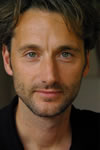Introducing Henk van Houtum
 Dr Henk van Houtum (1969) was born in The Netherlands and obtained his PhD at the University of Tilburg. Title of his dissertation was “The Development of Cross-Border Economic Relations”. He currently works as Associate Professor Geopolitics and Political Geography for the University of Nijmegen. Moreover, Mr van Houtum is Head of the Nijmegen Centre for Border Research.
Dr Henk van Houtum (1969) was born in The Netherlands and obtained his PhD at the University of Tilburg. Title of his dissertation was “The Development of Cross-Border Economic Relations”. He currently works as Associate Professor Geopolitics and Political Geography for the University of Nijmegen. Moreover, Mr van Houtum is Head of the Nijmegen Centre for Border Research.
Geopolitical Passport
Your relationship with geopolitics
At what age did you discover geopolitics and what attracted you to it?
In my research I attempt to make the often implicit and taken-for-granted construction and (normative) consequences of socio-spatial ordering and othering explicit and manifest. I focus thereby on the critical scrutinisation of the symbolic and performative communication and representation of borders and identities at various spatial scales, notably on the European, national and urban level.
I believe that by analysing how we border and/or construct Others, much is revealed of how we see and border and constitute ourselves. The significant Others that I have been studying in-depth over the past years is the case of immigrants. It is this case that illustrates powerfully how we construct strangers and thereby reproduce and reify our own national identities. I acknowledge that identity politics always involve a contested and contextual quest for the just balance between the freedom we allow for others and the doubt and uncertainty we allow for ourselves.
My current research interest feeds into such an overarching broader search for routes to constantly critically analyse, re-imagine and rethink our constructed definitions of territorial borders, identities and spaces of indifference.
My geopolitical preferences
What is your favourite definition of geopolitics?
Always the next one.
Which geopolitical scientist do you admire the most?
Nietzsche, for he has set the scene for thinking about how much Truth in terms of a bordered domain we need, and how much we can bear.
What is your favourite geopolitical book?
“Waiting for the Barbarians” by J.M. Coetzee (1980).
[Editor’s note: this book is an allegory of oppressor and oppressed.]
What is your favourite geopolitical website?
This one of course.
Our geopolitical future
Which geopolitical subject has been too little in the spotlight and needs further research?
The pertinence of the geopolitical map-making. Two thousand years of Euclidean thinking apparently is hard to overcome. Still, we are representing spaces and borders two-dimensionally on flat surfaces, as if there were no people living there. This is a form of cartographic cleansing, that seriously needs to be addressed. Together with the video-artists, photographers, and other imaginators, we need to think about ways, about how to represent the mobility and dynamics of geography and geopolitics, the moving lines, the moving spaces, the moving minds, rather than focusing on and mapping the fixity. So, rather than merely presenting the dots, arrows and lines in geography and cartography we need to think about the choreography of geopolitics.
What will be the largest geopolitical challenge for the world in the 21st century?
To construct a global just world, in which there is access to other domains and food and water for everyone, regardless where he/she lives or comes from. Technically this is possible. It is crucial to understand why and how we still geopolitically prevent this from happening and how we could help to strive for such global justice.
